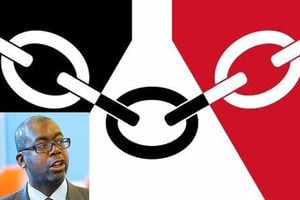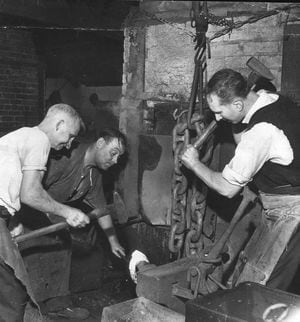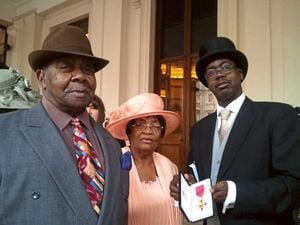Black Country flag row: Why I will never accept the chain logo
A leading racism campaigner who called the Black Country flag 'offensive and insensitive', today defended his views in the wake of an outcry from Express & Star readers.

Patrick Vernon OBE argues that the chains depicted on the flag are a 'disturbing' image of an industry that profited from the transatlantic slave trade and colonial rule in Africa.
This, from Dominique Fortune, was just one of the comments from the web as readers of the Express & Star shared their bafflement, surprise, disagreement and even downright fury over Patrick Vernon's comments that the Black Country flag was 'offensive'.
It is the use of chains as part of the design, in particular, which Mr Vernon sees as a symbol of the slave trade, that prompted his views.
Yet the very vast majority, well over 95 per cent of people, disagreed.
On Twitter, Andy Hollies, who has the flag as his Twitter profile picture, said: "Who is this idiot? It's a flag based on the historical industrial base of my region! Don't like it? Don't fly it!"
Mandeep Mahay added: "Holding on to past issues won't help anything. The flag is now a symbol of unity. Why slate that?"
On the Express & Star website Wolfie127 said: "What a shame when someone is trying to make a political point out of nothing.
"The Black County also made chains for the Titanic and for every factory-making heavy industry in the world which is something to celebrate. I think that the comments are a disgraceful attempt at trying to create racial tension rather than making a valid point which is of relevance."
Even those who agreed in part with Mr Vernon's concerns about being in denial over our history felt he had tainted his argument by making it in the wrong way.
Bill Heywood said: "His critique is too simplistic, clearly it's not racist. But it does bring up a part of our history that is uncomfortable.
Pauline Jazzi said: "The design for the flag was by a 12-year-old girl and rather than being of racial intent shows the lack of teaching of British history. If our children were taught all aspects of Black Country origins then that design would have probably not been drawn.
Mr Vernon continues: "I am very proud to have grown up in Wolverhampton as part of the Black Country, which is now a vibrant multicultural and multifaith society as a result of the contribution of migrant communities from the Caribbean, India, Pakistan and Africa as part of the Windrush Generation after the Second World War.
So having events like Black Country Day and cultural festivals are important, provided they respect, engage and understand the diversity and experiences of different communities.
At school in Wolverhampton I was taught about the industrial revolution and the role of the Black Country (including the smog and furnaces) as the manufacturing base of the country, with the iron, coal and canal networks and the investment in the steam, locomotive and cotton industry.
The slave trade was only mentioned in passing, but with reference that black people were lucky or grateful to be slaves. As a society a lot has moved on since then, especially in the last 40 years.
Tony Blair as Prime Minister in 2007 during the Bicentenary of the Abolition of the Slave Trade Act made a statement of regret of Britain's involvement in the trade and the Church of England and The Mayor of London, Ken Livingstone, made public apologies.
The TV mini-series in the 1970s called Roots – which is set to be remade – had a major impact in America in confronting its slave past.
The recent films '12 Years a Slave' and 'Belle' have also provided an opportunity for further discussion and dialogue over the last 18 months in the UK.
However the history of the Transatlantic Slave Trade is still an area that we shy away from and are still in denial of after 400 years. The recent reactions to my comments on the Express & Star website and the various trolls harassing me on my Twitter account reflects a degree of scepticism and criticism of 'political correctness gone mad' in suggesting that the Black Country ever had some involvement in the slave trade.
Again this highlights that we have not matured or reflected as a nation on our colonial past which has an impact both on black and white people.
If you look at family genealogies in the UK there remains a strong shared and collective history of slavery and colonisation of black ancestors and white ancestors.
The 'Legacies of British Slave-Ownership' project run by academics at University College London provides details of the £20 million (equivalent to £17 billion today) paid to slave owners.
The records hold details of over 3,000 absentee plantation owners along with 46,000 claims for compensation. The research project has identified beneficiaries such as the family of David Cameron, former minister Douglas Hogg, as well as authors Graham Greene and George Orwell.
Historian David Olusoga has a two-part major BBC documentary over the next few weeks highlighting this history and our shared past.
I have traced my family history from Wolverhampton, Jamaica and Senegal using oral history, DNA testing and the same research – that recorded my ancestors as chattels. Many families in the West Midlands are featured on the database who made their wealth in running plantations and providing a range of allied services to support the trade.
That is why I find the Black Country Day logo offensive, as the foundries and factories made chains, fetters, collars, padlocks and manacles which were used on slave ships from Africa and in the plantations during slavery in the Caribbean and North America. The iron was used for trading by merchants for exchange in Africa. Such was the extent of this trade, Henry Waldram, a Wolverhampton ironmaker, advertised his specialism in Sketchley's and Adam's Universal Directory of 1770 as 'Negro Collar & Handcuff maker'.

More research is still required to explore the full impact of this relationship between the Black Country and the Transatlantic Slave Trade. The Heritage Lottery Fund does recognise this history and legacy and has over several years provided £2.5m funding to museums, community organisations and academics to do research and develop education projects on Transatlantic slave trade, abolition and emancipation and its impact in the West Midlands.
It is disappointing that the organisers of Black Country Day and many politicians who responded to my comments are not willing or open to consider that the logo is offensive to the African and Caribbean community as well as to white working class women who were treated appallingly in the late 19th and early 20th century as chainmakers, leading to strike action in Cradley Heath in 1910.
If we were in America the chains logo would be seen as the equivalent as the Confederate Flag.
I am sure if Lenny Henry was aware of this history along with the general public we would be having a different conversation about truth and reconciliation and not using the race card or a 2015 version of River of Blood debate. Also, please don't bring the 12-year-old who designed the logo in to this debate as sort of shield. It is quite clear that the school competition was flawed in providing a holistically and factual approach to the use of chains as part of the design brief.

This reflects a wider issue around the national curriculum and why the impact of the slave trade and industrial revolution are not connected. It was only in 2013 I was part of a campaign working with politicians and celebrities to stop Michael Gove removing Mary Seacole from the national curriculum. We should use this opportunity to have an informed conversation about better public education in the Midlands for all to learn and understand this history.
I think It is time for the Black Country time to embrace its past so we can move forward."





